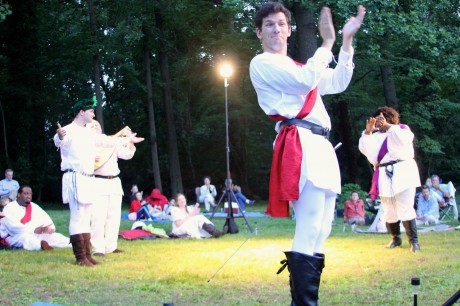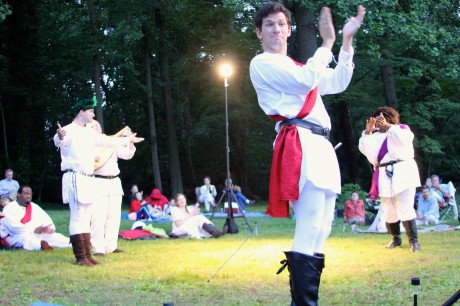Tis indeed summer and that to the world of the Bard means Much Ado About Nothing. And the Baltimore Shakespeare Factory is no exception to that rule as they mount their first in-the-round production this summer. Taking the well recognized comic back to its simplistic basics, the BSF strips away the scenery and all the other convolutions that can often clog-up Shakespeare’s wittiest comedy and present it in its original essence. Directed by Chris Cotterman, the show is an auspicious start to a fine summer season promised herein.

Simplicity is the best approach, using nothing but the elements and simple white cloth for costumes, designed by April Forrer. It is this minimalist approach that nods to true Shakespearean style; natural light, outdoors, no cumbersome sets, and this approach to the production allows the witty gems of Shakespeare’s writing to truly shine through the performance. Director Chris Cotterman has gathered a fine group of performers are articulate and deliver the word of the Bard’s humors with precision and ease, landing joke after joke upon the audience’s ears while making the strange vernacular approachable to those less familiar with the sound of the archaic language.
For a first attempt at a production in the round, the cast acoustics need work. With more practice, it is certain that the volume will not be an issue, and at present it only stands to be an issue with a few of the minor characters. Projecting voices and adjusting to the new style of blocking, this BSF production is a growing experience and will work its way to full success by the end of the run. The other main issue are the two gulling scenes wherein the characters lay traps of love for Benedick and Beatrice. While the concept behind the scene— having both Benedick and Beatrice respectively take umbrage in the audience as they try to spy upon their cousins and council— is brilliant, it is sadly lacking in its execution. Beatrice’s time in the audience is a bit more successful than Benedick’s as she crawls about more in earnest and haste. To make these scenes live up to their full comic potential the characters laying the trap and doing the gulling need to enter the audience as well, perform a bit of a chase to make the danger of being discovered real.
That said, Director Chris Cotterman has implored a few intriguing casting choices in his efforts to keep the cast contained. Using only 13 performers, who also double as musicians for the pre-show and intermission musical entertainment (a long-standing tradition at BSF where modern and appropriately themed songs are performed by the cast and characters to fit the mood of the show,) Cotterman finds unique approaches to a play that could easily contain a cast of 25 or more. In addition to his curious but rather effect double-casting, gender crossing comes into play where not only Senor Leonato (Sue Struve) is played by a woman, but Margaret (Jim Knost) and Ursula (Sean Elias) are played by men.
Elias, who doubles as the lovely singing Balthazar and Dogberry, has hilarious charm as the good lady Ursula. His dulcet tones harp well upon the audience’s ear when singing as Balthazar and his flamboyant over-the-top performance as Dogberry is one of the most memorable in the production. His true theatrical nature blazes through in the “I am an ass!” scene, a startling and hilarious moment which favors his sassy and histrionic nature.
Other performances of note include Don Pedro (Josh Thomas) who has a very modern approach to the character, making him one of the most relatable characters in the performance. There is something giddy and amusing about the way he teases Benedick over being in love. Thomas, who is one of only five performers who does not double his role, brings a jovial presence to the stage, even in the face of the showdown at the initial wedding, trying to keep his merriment subdued into a more stern visage.
The cast all round— from the rather mild mannered and deceptively cool-tempered Don John (Sean James) to the angsty young twitwit Claudio (Brendan Edward Kennedy)— gives strong performances of these characters, many still developing how best to relate their characters to the show and to the audience. The concept of having them all sit around the performance round as the show is in progress eases the transition of scene changes as the actors literally hop up and into the scene as their character approaches or arrives.
The sarcastic and easily incensed Beatrice (Jenna Rossman) has her work cut out for her against the strapping presence of the equally sarcastic and easily ruffled Benedick (Lonnie DeVaughan Simmons.) The pair quarrel well together, as a proper Beatrice and Benedick ought to; just enough flirtatious and underhanded subtext spritzed into their repartee so that when they land insults upon one another it stings with a hidden hand of pleasure. Rossman brings a saucy nature to show, a rather modern sound to her approach to the character as well. But there is something refreshing about her off-handed approach to the good lady Beatrice.

Simmons excels in his asides to the audience, particularly the inner trappings of his mind which pour out in soliloquy. The “perfect woman” speech ends up reading like a poem, addressed specifically to the audience as he plucks out women for comparison. Rossman’s delivery of her “beard speech” has a similar approach and effect as she hones in on various men from which to make examples. Simmons gives a versatile performance, following the tracks of the ride of love all the way to the end, upholding the Shakespearean witcrackers to the highest level of high-brow humor one can hold them.
Be sure to enjoy the end of the show; you might just find yourself feeling a little crazy in love after all the shenanigans that go down.
Running Time: 2 hours and 40 minutes with one intermission
Much Ado About Nothing plays through August 10, 2014 at the Baltimore Shakespeare Factory on the Great Meadow at the Evergreen Museum and Library— 4545 N. Charles Street in Baltimore, MD. Tickets may be purchased at the meadow or in advance online.

